|
|
 |
 |
 |
 |
|
FEATUREClass of 2003 Steps OutBY ALEX SACHARE ’71
|
|||||||||||||||||||||||||||||||||||||||||||||||||||||||||||||||||||||||||||||||||||||||||||||||||||
|
|
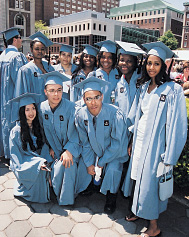 |
Under bright, sunny skies for Class Day and a cloudy drizzle for Commencement, more than 1,000 members of the Class of 2003 officially became alumni on May 22 and 23.
George Stephanopoulos ’82, ABC newsman and former adviser to President Clinton, was the keynote speaker at Class Day. He offered the graduates words of advice from his father: “Keep your balance,” and from legendary faculty member Lionel Trilling ’25: “Prize fearlessness more than happiness.”
|
|
 |
Stephanopoulos cited a Chinese proverb, “May you live in interesting times,” and described the times the graduates live in as interesting, indeed. “One of your duties is to make sense of these troubled times,” he said, noting that while members of the Class of 2003 were at Columbia, they witnessed “the impeachment of a president; the closest election in U.S. history, one that was not decided until a Supreme Court ruling; and the attacks of 9-11 that have changed all our lives.” He also noted changes on campus, most prominently in the makeup of the graduating class: “When I was here 21 years ago, there wasn’t a single woman in our classes. In the Class of 2003, there are 500.”
|
|
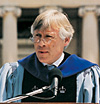 |
Also addressing the graduates were Dean Austin Quigley, who urged them to “remember the theme of independence and interdependence” and reminded them that “the greatest investment you make is the investment in other people,” and President Lee C. Bollinger, who referred to less-than-luxurious student living conditions and the rigors of a Columbia education and urged the graduates to “resist the temptations to luxury and the simple diversions of life” and “remember that you once lived in a dorm room, and you once read Plato and Aristotle and Dante.”
|
|
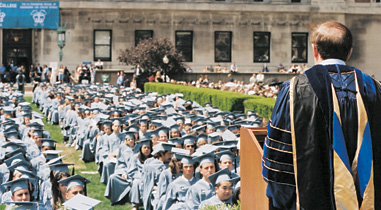 |
| Dean
Austin Quigley reminded members of the Class of 2003 of their capacity
to effect positive change on the world around them,
and challenged them to live up to this responsibility in
the wake of the events of 9-11. |
Class of 2003 Fund Committee Chairs Rhett Bonnett ’03, Michael Foss ’03, Michael Novielli ’03 and Christina Wright ’03, representing the 41-member committee, announced that a record 70 percent of the graduating class had donated to the Columbia College Fund and presented Quigley with a document listing the donors’ names.
|
|
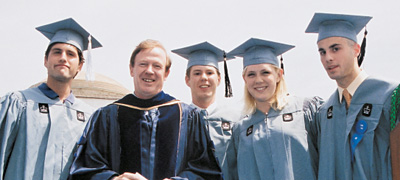 |
Class pins were presented to the graduates by members of the 50th reunion class: Joel Danziger ’53, Peter Fauci ’53, William Frosch ’53, Arthur Hessinger ’53, Jay Kane ’53, Victor Kevorkian ’53, George Lowry ’53, Pete Pellett ’53 and Martin Saiman ’53.
|
|
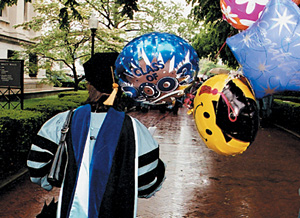 |
More than 35,000 people, including some 10,430 graduates, braved the gray skies and intermittent rains the following day as Bollinger made his first Commencement address. He referred to the events of 9-11 and told the graduates, “You have attended the University at a remarkable and possibly even momentous period,” a time that “spans a world that seemed to flourish in nearly every way to one when the world is struggling to come to terms with threats and instabilities, economic, political and social.” He urged graduates to ask themselves questions such as “What are our responsibilities?” and “What should be the character of our relationships with other parts of the world?”
|
|
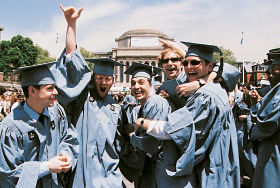 |
| Following the
ceremonies, students posted for pictures and whooped it up. |
The New York Times’ coverage of Commencement reported that graduates of the College “showered apple cores on the stairs in front of the dais in an unexplained but no doubt deeply symbolic act.” Senior class marshall Yoni Applebaum ’03 explained the symbolism in a letter to the editor:
“By tradition, graduates of each school at Columbia University brandish a totemic object when their dean presents the graduating class to the president,” he wrote. “Columbia College is perhaps most renowned for its Core Curriculum, the cluster of classes that provide the common foundation of classical learning. The apples provided us with a welcome snack, their cores with a convenient symbol of our unique education.”
|
|
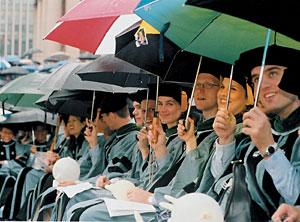 |
| Intermittent
rain failed to dampen spirits at Commencement. |
|
|
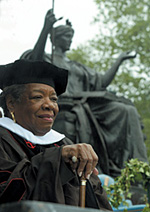 |
| Maya
Angelou, the author of I Know Why the Caged Bird Sings
who has received nominations for both the Pulitzer Prize and
the National Book Award, was among seven dignitaries who received
honorary degrees at Commencement. |
Seven honorary degrees were presented, to Maya Angelou, poet, writer and educator; Julian Hochberg, psychologist and Centennial Professor Emeritus of Psychology; Sir Frank Kermode, critic and teacher of English literature; Mary-Claire King, American Cancer Society Professor of Medicine and Genetics at the University of Washington; Constance Baker-Motley, U.S. District Court judge and an alumna of the Law School; Cecil Taylor, jazz pianist and composer; and Andrew Wiles, Eugene Higgins Professor of Mathematics at Princeton.
|
|
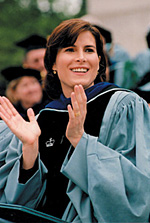 |
| ABC
News correspondent Claire Shipman ’86 was awarded the
University Medal for Excellence. |
Finally, five faculty members received teaching awards: Adjunct Professor of Film Lawrence Engel, Assistant Professor of Sociomedical Science Amy Fairchild, Brander Matthews Professor of English and Comparative Literature Martin Meisel, Batchelor Memorial Professor of Electrical Engineering Yannis Tsvidis and William P. Schweitzer Professor of of Chemistry Nicholas Turro.
| Related Links | ||||||
| ||||||
| || | || |
CCT Home |
|
|
CCT Masthead |